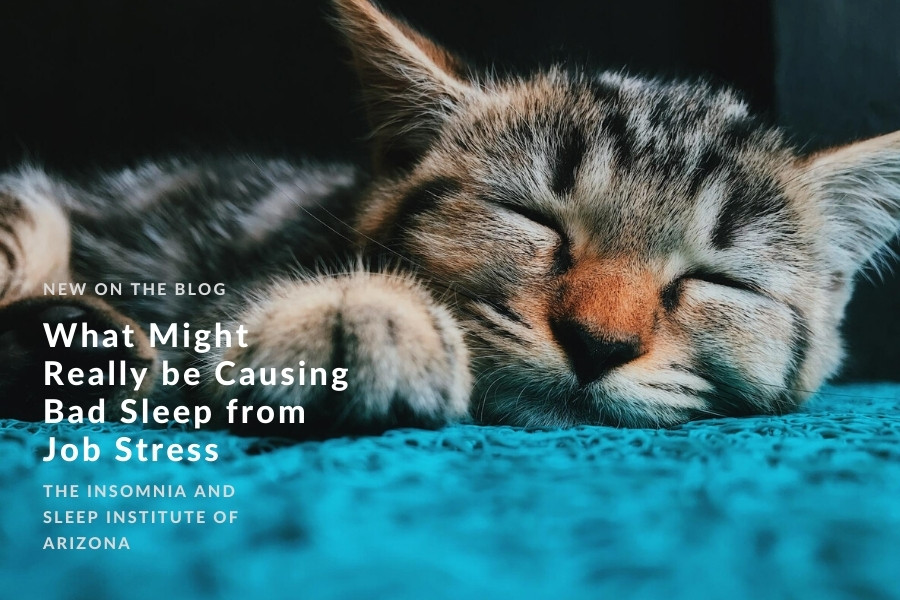If you have a high-stress job and sleep troubles, the cause might be obvious. However, according to a new study, the actual cause of sleep troubles from such a stressful work environment might be lack of support from higher-ups as well as colleagues. Lack of sleep, also known as insomnia, is one of the most common reasons patients come to The Insomnia and Sleep Institute of Arizona. Chronic insomnia, which can occur with stressful jobs, is tied to a variety of serious conditions, including early death. Fortunately, there are methods for correcting insomnia.
The study, which was published in JAMA Open Network, revealed that when people have better social and psychological support at work, they can better turn off the workday when they leave work. This is a must for downtime, to de-stress, and ultimately to get better sleep. According to one sleep expert,
This study highlights the important role that workplace environment and stress have beyond the setting of work on overall well-being. Initiatives to improve wellbeing in the workplace can improve sleep, but at a personal level, what we can optimize is our sleep quality—which in turn can help to handle stress and ultimately increase resilience to daily challenges we face.
The study considered data from almost 115,000 participants in Sweden, Denmark, and Finland over a six-year period.
What the Study Showed on Sleep
The research team took a look at top-down resources, including procedural justice, the quality of leadership, listening abilities, and how fairness was perceived at work. Horizontal resources were also considered, such as how supportive and collaborative colleagues were. “Collaboration” is defined in this study as working “closely” with others to reach a shared goal.
“Sleep problems” in the study were defined as being tired in the daytime (at least twice per week), lack of sleep quality, and trouble falling asleep and/or staying asleep. Such issues must persist for one to three months in order to be categorized as a “sleep problem.” There were other factors, like pre-existing conditions and age, that were also delineated. The team found that in a two-year time frame, 53 percent of participants had a change in their workplace. Positive changes in leadership and/or fairness led to a decline in sleep problems. The largest decline happened when someone experienced an improvement in four workplace areas: leadership and fairness as well as coworker support and collaboration. Negative changes led to an increase in sleep issues with 25 percent of people reporting trouble getting enough rest with a negative workplace change. The researchers say,
Our findings justify future intervention studies to examine the extent to which improvements in workplace psychosocial resources could facilitate remission or recovery from sleep disturbances and prevent development, deterioration, or prolongation of sleep disturbances among employees.
Negativity in the fairness and leadership section was linked to the most significant, chronic sleep impact—more so than with negative shifts with coworker collaboration and support.
A Fixable Downward Spiral
There are limits to what you can do to change your workplace environment. However, there are many things you can do to help turn off work once you leave the workplace and develop good sleep hygiene habits to promote healthy sleep. Ultimately, what this study describes is insomnia fed by work, so it’s important to control what you can. Changing your sleeping space, adopting healthier habits, and seeing a sleep specialist for insomnia are all critical in order to protect your sleep—and your health.
There are options besides medication, such as cognitive behavioral therapy for insomnia (CBT-I). Changing your sleep schedule, such as taking on healthy, sleep-inducing habits at night like reading a book, meditating, or taking a bath, can all help. Journaling and writing down to-do lists can also help ease anxiety so you can sleep. Chronic insomnia is serious, dangerous, and needs to be addressed, especially if you have little control over workplace negativity. To find out more about options for treating insomnia and to schedule your no-referral consultation with a sleep expert who can diagnose sleep disorders, contact us today. Call The Insomnia and Sleep Institute during business hours or, for the fastest response, complete the online contact form right now.





